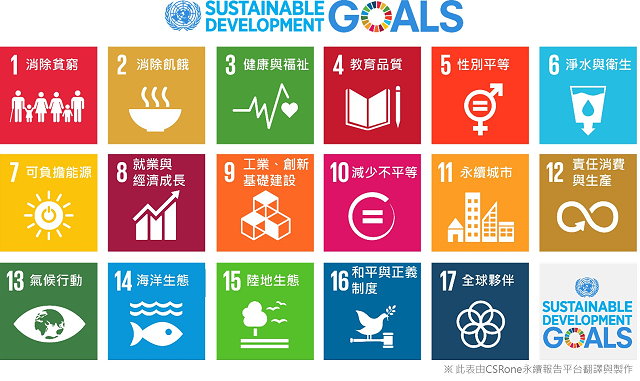
自1980年起,至今39年來,聯合國世界旅遊組織( World Tourism Organization, UNWTO)在每年的9月27日「世界旅遊日」(World Tourism Day),都提出一個倡議主題,藉以提醒並促進大眾認識觀光旅遊在社會、文化、政治及經濟等層面的重要影響力。今(2019)年的世界旅遊日主題是「旅遊與工作:為所有人共築美好未來」(Tourism and Jobs: a better future for all),強調旅遊業是世界主要的產業之一,創造無數可貴的工作機會,也符合聯合國2030年永續發展的第八項「就業與經濟成長」目標,同時也要善用新科技為旅遊業創造更大契機。
(編按:我個人偏向將「Tourism and Jobs」翻譯成「旅遊與就業」,比較符合今年議題主旨,免得一般人看到「工作」,想到的是「旅遊」跟「辛苦工作」的比較,不過聯合國世界旅遊組織官方網站的翻譯既然用「旅遊與工作」,我只好遵循。)
 聯合國永續發展17項目標
聯合國永續發展17項目標
旅遊業:全球主要行業
過去六十年來,旅遊業不斷擴大和多元化,已成為世界上成長最快、最重要的經濟產業之一,惠及全球各旅遊地和所在社區。國際遊客從1950年的2,500萬人次,增長到2015年的近13億人次。同樣的,全球旅遊地的國際旅遊收入從1950年的20億美元,增進到2015年的1,260兆美元。旅遊業貢獻了全球約10%的國內生產總值和10%的就業機會。
Tourism: A Key Sector in the World
Over the past six decades, tourism has experienced continued expansion and diversification, and it has become one of the fastest growing and most important economic sectors in the world, benefiting destinations and communities worldwide. International tourist arrivals worldwide have grown from 25 million in 1950 to nearly 1.3 billion today. Similarly, international tourism revenues earned by destinations around the world have grown from 2 billion US dollars in 1950 to 1260 trillion in 2015. The sector represents an estimated 10% of the world’s GDP and 1 in 10 jobs globally.
以下就世界旅遊組織「2019世界旅遊日」(World Tourism Day 2019)網站對這次主題闡述的內容,摘譯幾個重點,請參考。(如有翻譯錯誤敬請不吝指正)
前言
- 旅遊業在創造就業機會的功用常被低估,其實旅遊業創造了世界10%的工作崗位,並因其創造合宜工作的潛力而符合聯合國永續發展目標的第8項目標。
- 必須制定新政策,以最大幅度發揮旅遊業創造更多、更好工作機會的潛力,尤其是對婦女和青年而言。我們也需要新的政策來反映和搭配不斷進步的技術。
- 政策和行動應著眼於解決目前所傳授的旅遊業技能跟旅遊業雇主需求之間存在落差的問題。
- 這就需要為旅遊業的未來採取整體性的方針,並加強包括公私部門在內的各方之間的合作。
- Tourism’s role in job creation is often undervalued. This is despite the fact that tourism generates 10% of world jobs and is included in Sustainable Development Goal 8 for its potential to create decent work.
- New policies are needed to maximize tourism’s potential to create more and better jobs, especially for women and youth. New policies are also needed to reflect and incorporate ongoing advances in technology.
- Policies and actions should be geared towards addressing the current mismatch between tourism skills that are taught and those that tourism employers need.
- This requires a holistic approach to the future of work in tourism, with heightened cooperation between all actors, including the public and private sectors.
未來的工作方向
創造和確保公平就業對於增進社會包容、和平與安全至關重要,應當充分利用每個經濟部門提供合宜工作的潛力。
新技術的出現發展出新的工作型態,這些型態正在全球迅速改變生產過程,這為現有的就業、福利和教育進程提供了機遇,也帶來了壓力。
根據國際勞工組織(ILO)統計,全球失業率仍高,到2018年將超過1.9億人無業。因此,所有部門和國家都需要創造更多和更好的工作條件,而擁抱新技術對實現這一目標可以發揮關鍵作用。
要突破新一波的技術儘可能地具有包容性,就需要對生活和工作的培訓與技能進行大量投資。每個人都應該有機會發揮自己的全部潛能,以便從新技術時代中受益。
為此,我們必須對技術變革帶來社會經濟成長、就業和不平等的影響有所研究。我們還須為正在尋找工作的人以及面臨自動化風險的人提供工具和技能。
國際勞工組織於2019年成立一百週年之際,發布了「為更美好的未來而工作:全球委員會關於未來工作的報告」。這份具有里程碑意義的報告注意到了改變世界的力量—技術、氣候變遷、人口統計、全球化,呼籲進行以人為本的未來工作進程。
以人們及其工作作為經濟、社會政策及商業實務的中心,要通往發展、公平和永續性的途徑,就需要行動三箭:
- 增加人們能力的投資
- 增加對工作機構的投資
- 增加對合宜和永續工作的投資
旅遊業是一個以人為本的領導產業,其成長速度超越了世界經濟成長和國際貿易。 它是全球主要的出口類別之一,對勞動力的影響很大,是國際勞工組織以人為中心的未來工作議程的當然盟友。
The future of work
Creating and ensuring equitable employment is essential to increasing social inclusion, peace and security. The potential of every economic sector to provide decent jobs should be utilized to its fullest.
The emergence of new technologies has led to the development of new forms of work that are rapidly changing production processes worldwide. This both provides opportunities for, and puts pressure, on existing employment, welfare and education agendas.
According to the International Labour Organisation (ILO), global unemployment remains high, reaching more than 190 million in 2018. All sectors and countries, therefore, need to create the conditions for more and better jobs. Embracing new technology can play a key role in achieving this goal.
Making the new wave of technological breakthroughs as inclusive as possible will require considerable investment in training and skills for life and work. Everyone should have a chance to develop their full potential so as to benefit from the new technological era.
To do this we need to examine the impact of technological change on socioeconomic growth, jobs and inequality. We also need to provide tools and skills to those who are looking for a job and as well as to those whose jobs are at risk of automation.
On the occasion of its centenary in 2019, the ILO released ‘Work for a Brighter Future: Report of the Global Commission on the future of Work’. This landmark report takes note of the forces transforming the world – technology, climate change, demography, globalization – to call for a human-centered agenda for the future of work.
By placing people and the work they do at the centre of economic and social policy and business practice, the path towards growth, equity and sustainability consists of three pillars of action:
- Increase investment in people’s capabilities
- Increase investment in the institutions of work
- Increase investment in decent and sustainable work
Tourism is a leading people-to-people sector, with growth rates outpacing world economic growth and international trade. It is one of the main global export categories and with such a high impact on human workforce, it serves as a natural ally of ILO’s human-centered agenda for the future of work.
旅遊工作和數位革命–主要挑戰
全球化、技術進步和人口變化重新定義了旅遊業及其運作方式的趨勢。 如今,我們處在高度聯繫、高度訊息化的世界核心,是個數位革命的市場,並對旅遊業工作技能與特色有更多的需求。 近年來,出現了數位化突破性的發展,包括新的旅遊服務平台(所謂的共享或協作經濟),大數據和地理定位。
旅遊業勞動力在適應技術革命方面,所面臨的一些主要問題是:
- 需要檢視和更新有關支持就業、創新、企業家精神和新商業模式的過時法令和規則
- 對新技術和發展趨勢缺乏認知與專業知識
- 缺乏對當前和未來工作新技術和培訓的投資
- 利益相關者之間缺乏合作與溝通
Tourism jobs and the digital revolution – the main challenges
Globalization, technological progress and demographic change are trends that, together, have redefined the tourism sector and how it functions. At the heart of our now hyper-connected, hyper-informed world is a digital-led revolution in markets, as well as in the demand for skills and the characteristics of tourism jobs. Recent years have seen the emergence of digital breakthroughs, including new platform tourism services (the so-called sharing or collaborative economy), big data and geo-localization.
Some of the main issues the tourism sector faces in adapting its workforce to the technological revolution are:
- The need to review and update outdated legislation and regulation that supports employment, innovation, entrepreneurship and new business models
- The low level of awareness and expertise of new technologies and technological trends
- A lack of funding to invest in new technologies and training for the jobs needed for the present and future
- The lack of cooperation and communication among relevant stakeholders
促進旅遊業提供工作機會給所有人,尤其是青年、婦女和農村社區
與其他多數產業相比,旅遊業僱用更多的婦女和年輕人。
在「經濟合作暨發展組織」的歐洲國家,旅遊業有將近一半(47%)的從業者年齡在15至34歲之間,而同樣年齡區間在全球經濟體系的比例只有1/3(32%)。
在全球「經濟合作暨發展組織」的國家,婦女佔旅遊業就業人口的60%。這一比例高於服務業的47%和整個經濟體系的43%。
婦女在旅遊創業中發揮領導作用。 聯合國世界旅遊組織 / 聯合國婦女署的研究顯示,全球酒店和餐廳的女企業家比例(36%)相對高於所有產業的總和(22%)。
此外,旅遊業不僅在農村和偏遠地區創造了就業機會,也透過保存和恢復傳統活動而間接創造了工作機會。通常,旅遊業是這些地區很少的可行經濟產業之一。
「永續發展目標」的「目標8」明確提到了旅遊業,即透過提供合宜的就業機會和復興當地傳統產業,體認到旅遊業在農村社區生計和繁榮方面的變革潛力。
透過為婦女、青年和農村社區提供各種角色的機會,旅遊業在實現「永續發展目標」的幾個目標領域做出了貢獻,這些目標領域涉及弱勢族群的賦權以及更加平等和包容的社會。更多的包容性增強了旅遊業的力量,使人們跨文化團結在一起,以頌揚多樣性,並增強了社會整體的適應力。
儘管旅遊業提供了這些好處,但也必須解決這些群體在就業方面的嚴峻挑戰。
一是性別工資差距很大。旅遊業中,女性在同樣技能的平均收入比男性工人低20-25%。在非標準形式的就業(編按:如打工、派遣、臨時)人口中通常以婦女居多。婦女在獲得教育和培訓方面也遭受種族隔離。
低技能婦女常常做的是最低微的工作,面臨著惡劣的工作條件、不平等的機會和待遇,以及暴力、剝削、壓力和性騷擾的風險。
臨時和兼差工作在從事旅遊業的婦女、年輕人和低技能人士中是很普遍的。這些常常會導致跟合宜工作的差距,包括社會保險覆蓋面不足,低工資和收入不平等,以及工作條件差。
旅遊業的需求週期變化多端,工作時間不規律且輪班變化不可預測,這對試圖兼顧工作和家庭責任的人(無論性別)構成了額外的挑戰。但是,相對的,這種靈活性也可以為希望將旅遊業的工作跟其他職業相結合的個人提供了好機會。
Promoting jobs for all in tourism – youth, women and rural communities
The tourism sector employs more women and young people than most other sectors.
Just under half (47%) of people working in tourism in European OECD countries are between 15 and 34 years of age, compared to a third (32%) of workers in the economy as a whole.
In OECD countries, women account for 60% of employment in the tourism sector. This is higher than the share of women employed in the services sector (47%) and in the economy as a whole (43%).
Women play a leading role in tourism entrepreneurship. UNWTO/UNWomen research shows that the global rate of women entrepreneurs in ‘hotels and restaurants’ (36%) is comparatively higher than in all sectors combined (22%).
Furthermore, tourism creates jobs in rural and remote areas, not only directly but also indirectly through the preservation and restoration of traditional activities. Often it is one of the few viable economic sectors in these areas.
The explicit mention of tourism in Goal 8, target 8.9 of the SDGs recognizes its transformational potential on livelihoods and prosperity in rural communities, both through providing access to decent employment and through reviving traditional local industries.
By providing opportunities for women, youth and rural communities in a variety of roles, tourism contributes to several SDG target areas surrounding empowerment of vulnerable groups and more equal and inclusive societies. More inclusion strengthens tourism’s power to unite people across cultures in a celebration of diversity, increasing overall social resilience.
Despite these benefits tourism provides, it must also address serious challenges surrounding employment for all of these groups.
One is a large gender pay gap. In tourism, women are on average paid 20-25% less than male workers for comparable skills. Women are often over-represented in non-standard forms of employment. Women also suffer segregation in terms of access to education and training.
Low-skilled women often find themselves in the most vulnerable jobs, at risk of poor working conditions, inequality of opportunity and treatment, violence, exploitation, stress and sexual harassment.
Temporary and part-time jobs are particularly common among women, young people, and the less-skilled who are employed in tourism. They can often lead to decent work deficits, including inadequate social security coverage, low wages and income inequality, and poor working conditions.
The tourism sector’s variable demand cycle, with irregular working hours and unpredictable shifts, poses additional challenges for those (of any gender) trying to reconcile work and family responsibilities. At the same time, however, this flexibility may also provide opportunities to individuals wanting to combine a job in tourism with another occupation.
延伸閱讀:
2016世界旅遊日「人人旅遊:促進全面無障礙旅遊」宣言(中英對照)
《世界已經轉變—旅遊業的大趨勢及其意涵》重點摘譯(中英對照)
全球永續旅遊準則-旅遊地篇中英對照及與2030永續新禧年17項永續發展目標之對應
本部落格「生態旅遊或觀光遊憩」專欄各文








可是,請環保旅遊!
感謝老師提供這麼棒的資訊
台灣真的該好好發展優質旅遊產業